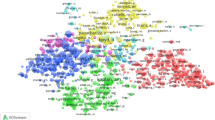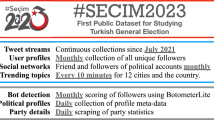Abstract
This study focuses on social media use of citizens from two groups that are often associated with the rise of social media: populist and postmaterialist citizens. Considering their ideological underpinnings, we theorize that they will make more political use of social media and that this further reifies their political attitudes into voting for populist and postmaterialist parties, respectively. Using unique survey data including the relatively new populist attitudes and political use of social media, we test this theory on the Dutch case. We find that both groups do not read political news or connect to politicians more, but both are more likely to react to political content. Moreover, social media use does not seem to lead to a retention in one’s own ideological funnel signified by populist or postmaterialist voting. Among more postmaterialist citizens, passive social media use even makes it more likely to vote for other parties.
Similar content being viewed by others
Notes
Used modules: Politics and Values and Religion and Ethnicity (waves 6–9). After matching on the LISS panel ID 132 observations were still missing and dropped.
“Not one,” “Yes, a few,” “Yes, 5 or more,” “Yes, 10 or more,” “I do not have a Facebook or Twitter account.”
“Never,” “Sometimes,” “Once every few weeks,” “Weekly,” “Daily”; not presented to people answering “I do not have …” on the first item, who were coded never.
Voting intention was derived from the Politics and Values modules of the LISS panel.
Including non-voters in the reference category did not lead to substantially different results.
Factor loadings > 0.4; Cronbach’s alpha > 0.7.
Models measuring populist and postmaterialist attitudes as dummies were also constructed to check for nonlinearities; where relevant this is reported in the text.
Particularly so, because in the Dutch context, social media use is very widespread, making it very likely that citizens at least consume some political information via social media.
Assuming average income, anti-EU and anti-immigration attitudes, age, religious attendance; being male, employed, non-politically interested, vocationally educated, non-religious.
References
Akkerman, A., C. Mudde, and A. Zaslove. 2014. How Populist Are the People? Measuring Populist Attitudes in Voters. Comparative Political Studies 47(9): 1324–1353.
Blais, A. 2000. To Vote or Not to Vote? The Merits and Limits of Rational Choice Theory. Pittsburgh: University of Pittsburgh Press.
Bossetta, M. 2018. The Digital Architectures of Social Media: Comparing Political Campaigning on Facebook, Twitter, Instagram, and Snapchat in the 2016 US Election. Journalism and Mass Communication Quarterly 95(2): 471–496.
Boulianne, S. 2015. Social Media Use and Participation: A Meta-Analysis of Current Research. Information, Communication and Society 18(5): 524–538.
Caiani, M., and L. Parenti. 2009. The Dark Side of the Web: Italian Right-Wing Extremist Groups and the Internet. South European Society and Politics 14(3): 273–294.
CentERdata. 2018. LISS Core Study. [Data files and codebooks]. https://www.lissdata.nl/access-data. Accessed 18 Mar 2018.
Colleoni, E. 2014. Echo Chamber or Public Sphere? Prediciting Political Orientation and Measuring Political Homophily in Twitter Using Big Data. Journal of Communication 64(2): 317–332.
Copeland, L. 2014. Value Change and Political Action: Postmaterialism, Political Consumerism, and Political Participation. American Politics Research 42(2): 257–282.
Dimitrova, D., A. Shehata, J. Strömback, and L. Nord. 2014. The Effects of Digital Media on Political Knowledge and Participation in Election Campaigns: Evidence from Panel Data. Communication Research 41(1): 95–118.
Engesser, S., N. Ernst, F. Esser, and F. Büchel. 2017a. Populism and Social Media: How Politcians Spread a Fragmented Ideology. Information, Communication and Society 20(8): 1109–1126.
Engesser, S., N. Fawzi, and A. Larsson. 2017b. Populist Online Communication: Introduction to the Special Issue. Information Communication and Society 20(9): 1279–1292.
Flaxman, S., S. Goel, and J. Rao. 2016. Filter Bubbles, Echo Chambers, and Online News Consumption. Public Opinion Quarterly 80: 298–320.
Gibson, R., and I. McAllister. 2011. Do Online Election Campaigns Win Votes? The 2007 Australian “YouTube” Election. Political Communication 28: 227–244.
Gil de Zúñiga, H., N. Jung, and S. Valenzuela. 2012. Social Media Use for News and Individuals’ Social Capital, Civic Engagement and Political Participation. Journal of Computer-Mediated Communication 17: 319–336.
Gil de Zúñiga, H., L. Molyneux, and P. Zheng. 2014. Social Media, Political Expression, and Political Participation: Panel Analysis of Lagged and Concurrent Relationships. Journal of Communication 64(4): 612–634.
Groshek, J., and K. Koc-Michalska. 2017. Helping Populism Win? Social Media Use, Filter Bubbles, and Support for Populist Presidential Candidates in the 2016 Election Campaign. Information, Communication and Society 20(9): 1389–1407.
Hameleers, M., L. Bos, and C. de Vreese. 2018. Selective Exposure to Populist Communication: How Attitudinal Congruence Drives the Effects of Populist Attributions of Blame. Journal of Communication 68(1): 51–74.
Himelboim, I., S. McCreery, and M. Smith. 2013. Birds of a Feather Tweet Together: Integrating Network and Content Analyses to Examine Cross-Ideology Exposure on Twitter. Journal of Computer-Mediated Communication 18(2): 154–174.
Inglehart, R. 1997. Modernization and Postmodernization: Cultural, Economic, and Political Change in 43 Societies. Princeton UP: Princeton.
Inglehart, R. 2008. Changing Values Among Western Publics from 1970 to 2006. West European Politics 31(1–2): 130–146.
Inglehart, R., and P. Abramson. 1999. Measuring Postmaterialism. American Political Science Review 93(3): 665–677.
Iyengar, S., and K. Hahn. 2009. Red Media, Blue Media: Evidence of Ideological Selectvitiy in Media Use. Journal of Communication 59: 19–39.
Jacobs, K., L. Sandberg, and N. Spierings. 2020. Twitter and Facebook: Populists’ Double-Barreled Gun? New Media and Society 22(4): 611–633.
Jacobs, K., and N. Spierings. 2016. Social Media, Parties, and Political Inequalities. New York: Palgrave MacMillan.
Jacobs, K., and N. Spierings. 2019. A Populist Paradise? Examining Populists. Twitter adoption and use’ Information Communication and Society 22(12): 1681–1696.
Krämer, B. 2017. Populist Online Practices: The Function of the Internet in Right-Wing Populism. Information Communication and Society 20(9): 1293–1309.
Kruikemeier, S., G. van Noort, R. Vliegenthart, and C. de Vreese. 2013. Getting Closer: The Effects of Personalized and Interactive Online Political Communication. European Journal of Communication 28(1): 53–66.
Lawrence, E., J. Sides, and H. Farrel. 2010. Self-Segregation or Deliberation? Blog Readership, Participation, and Polarization in American Politics. Perspectives on Politics 8(1): 141–157.
Lehr, A. 2016. Work and Politics. [Data file and codebook].
Littler, M., and M. Feldman. 2017. Social Media and the Cordon Sanitaire: Populist Politics, the Online Space, and a Relationship that Just Isn’t There. Journal of Language and Politics 16(4): 510–522.
Mazzoleni, G. 2008. Populism and the Media. In Twentyfirst Century Populism: The Spectre of Western European Democracy, ed. D. Albertazzi and D. McDonnell, 49–64. Basingstoke: Palgrave.
Messing, S., and S. Westwood. 2014. Selective Exposure in the Age of Social Media: Endorsements Trump Partisan Source Affiliation When Selecting News Online. Communication Research 41(8): 1042–1063.
Mood, C. 2010. Logistic Regression: Why We Cannot Do What We Think We Can Do, and What We Can Do About It. European Sociological Review 26(1): 67–82.
Mudde, C. 2007. Populist Radical Right Parties in Europe. Cambridge: Cambridge UP.
Norris, P. (ed.). 1999. Critical Citizens: Global Support for Democratic Government. Oxford: Oxford UP.
Norris, P. 2001. Digital Divide: Civic Engagement, Informartion Poverty, and the Internet Worldwide. Cambridge: Cambridge UP.
Salgado, S. 2018. Where’s Populism? Online Media and the Diffusion of Populist Discourses and Styles in Portugal. European Political Science 18: 53–65.
Schaub, M., and D. Morisi. 2020. Voter Mobilisation in the Echo Chamber: Broadband Internet and the Rise of Populism in Europe. European Journal of Political Research 59(4): 752–773.
Schlozman, K., S. Verba, and H. Brady. 2012. The Unheavenly Chorus: Unequal Political Voice and the Broken Promise of American Democracy. Princeton: Princeton UP.
Schulz, A. 2019. Where Populist Citizens Get the News: An Investigation of News Audience Polarization Along Populist Attitudes in 11 Countries. Communication Monographs 86(1): 88–111.
Schulz, A., W. Wirth, and P. Müller. 2018. We are the People and You are Fake News: A Social Identity Approach to Populist Citizens’ False Consensus and Hostile Media Perceptions. Communication Research 12: 1–26.
Segesten, A., and M. Bossetta. 2017. A Typology of Political Participation Online: How Citizens Used Twitter to Mobilize During the 2015 British General Elections. Information, Communication and Society 20(11): 1625–1643.
Sotirovic, M., and J. McLeod. 2001. Values, Communication Behavior, and Political Participation. Political Communication 18(3): 273–300.
Spierings, N., and K. Jacobs. 2014. Getting Personal? The Impact of Social Media on Preferential Voting. Political Behavior 36(1): 215–234.
Spierings, N., and K. Jacobs. 2019. Political Parties and Social Media Campaigning: A Qualitative Comparative Analysis of Parties’ Professional Facebook and Twitter Use in the 2010 and 2012 Dutch Elections. Acta Politica 54(1): 145–173.
Spierings, N., K. Jacobs, and N. Linders. 2019. Keeping an Eye on the People: Who has Access to MPs on Twitter? Social Science Computer Review 37(2): 160–177.
Stier, S., N. Kirkizh, C. Froio, and R. Schroeder. 2020. Populist Attitudes and Selective Exposure to Online News: A Cross-Country Analysis Combining Web Tracking and Surveys. The International Journal of Press/Politics. https://doi.org/10.1177/1940161220907018.
Stier, S., L. Posch, A. Bleier, and M. Strohmaier. 2017. When Populists Become Popular: Comparing Facebook Use by the Right-Wing Movement Pegida and German Political Parties. Information, Communication and Society 20(9): 1365–1388.
Stroud, N. 2008. Media Use and Political Predispositions: Revisiting the Concept of Selective Exposure. Political Behavior 30: 341–366.
Theocharis, Y., W. Lowe, J. van Deth, and G. Garcia-Albacete. 2015. Using Twitter to Mobilize Protest Action: Online Mobilisation Patterns and Action Repertoires in the Occupy Wall Street, Indignados, and Aganaktismenoi Movements. Information, Communication and Society 18(2): 202–220.
Trilling, D., and K. Schoenbach. 2015. Challenging Selective Exposure: Do Online News Users Choose Sites that Match Their Interests and Preferences? Digital Journalism 3(2): 140–157.
Van Kessel, S., and R. Castelein. 2016. Shifting the Blame. Populist Politicians’ Use of Twitter as a Tool of Opposition. Journal of Contemporary European Research 12(2): 594–614.
Author information
Authors and Affiliations
Corresponding author
Additional information
Publisher's Note
Springer Nature remains neutral with regard to jurisdictional claims in published maps and institutional affiliations.
Supplementary Information
Below is the link to the electronic supplementary material.
Rights and permissions
About this article
Cite this article
Jeroense, T., Luimers, J., Jacobs, K. et al. Political social media use and its linkage to populist and postmaterialist attitudes and vote intention in the Netherlands. Eur Polit Sci 21, 193–215 (2022). https://doi.org/10.1057/s41304-020-00306-6
Accepted:
Published:
Issue Date:
DOI: https://doi.org/10.1057/s41304-020-00306-6





